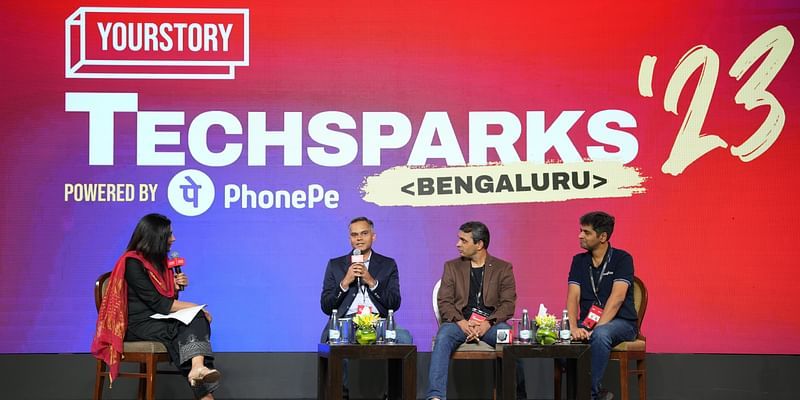How GenAI is helping businesses unlock value
At TechSparks 2023 Bangalore edition, experts discussed GenAI’s impact on businesses and how it is reshaping the way they operate and innovate.
Generative Artificial Intelligence (GenAI) has garnered immense attention for its potential to revolutionise businesses across various sectors. However, realising the promise of GenAI and translating it into tangible business value remains a significant challenge for organisations.
During a panel discussion at TechSparks 2023, India’s most influential startup-tech conference, Chintan Shah, Director, Digital Native Business at Google Cloud India; Anshoo Sharma, Co-founder and CEO, ; and Abhijit Khasnis, Vice President, Technology, ; explained how businesses can effectively harness GenAI to create value, drive innovation and gain competitive edge. In conversation with Shradha Sharma, Founder and CEO of YourStory, these experts discussed how the promise of GenAI can be converted into business value.
GenAI transforming business
With GenAI permeating all parts of business at a spectacular pace, it has surpassed the pace of innovation and adoption of the Internet, mobile devices and personal computing, said Chintan Shah, Director, Digital Native Business at Google.
While customers today are trying to solve various aspects of business, a single AI solution or platform can transmit across multiple problems that businesses are trying to solve. It is additive and has a network which catches on.
Explaining use cases, Shah cited the example of a business that has built an info bot for employees that was extended for partners and suppliers and then users and consumers. “This integration and ability to improve products and services is amazing. GenAI solutions will improve rapidly as more data and users come on board,” Shah said. According to him, use cases in GenAI typically enable three parts of a business. “It can help to automate, scale and improve business processes across industries like healthcare, logistics, banking, manufacturing, content generation, among others,” he said. To elaborate his point, Shah gave the example of how GenAI is being used by a media company to create snippets from its content pool, to make it more viewer friendly for consumption.
Anshoo Sharma, Co-founder and CEO, Magicpin, which brings local markets to online buyers across categories like retail, food, and entertainment, explained how GenAI is helping local merchants build suitable marketing avenues at this startup. “GenAI has made solutions more accessible. This technology is helping businesses think out of the box, driving transformation, and bringing in more personalisation for users,” he said.
Abhijit Khasnis, Vice President, Technology, HealthifyMe, shared that the company launched a food photo recognition system for the HealthifyMe app. “We built the entire solution on top of vision foundation models that have been trained on a billion plus parameters, which helps to recognise one and a half lakh Indian foods with a photo,” he said.
According to him, GenAI has helped to rebuild the interface for HealthifyMe to engage with its user base in local languages, making its services accessible in multi-modal ways to users.
Leveraging AI and being cost effective
In the context of building cost-effective solutions through GenAI, Shah said businesses needed to pick a user journey that they want to change or transform and start building a use case to solve challenges in that journey. “This will have a network effect and help solve problems that a business never saw earlier or was difficult to solve. Powerful technologies have made it easier to go on such paths,” he said.
To integrate GenAI in businesses, it is also imperative that the technology is utilised within the organisation by employees, shared Sharma of Magicpin. “That is the starting point. Once people start seeing how it can make things better, adoption is higher. From content marketing, coding to analytics, we saw our employees understand that they could make a difference on a day-to-day basis. So, personal use built a culture of adoption,” he added.
He gave an example of how calculating customer probability through GenAI helped drive growth and conversation, which then led the organisation to ask more relevant questions for better customer experiences.
Khasnis, of HealthifyMe, explained how leveraging AI is also an incremental journey for businesses and not about replacing human services. “It is a step-by-step journey, where we said if there were 100 questions being answered by a coach, two could be answered by GenAI. We started using GenAI to augment existing human capacity, so that our coaches were able to focus on other things. That helped us as a business to handle more clients per coach, which directly translated to money for the business,” he added.
Shah identified three distinct areas that Google Cloud could help businesses in while on their GenAI adoption journey. “The first area is the foundational work, where large language models are created; the second is building applications; and the third is at the infrastructure level, where Google Cloud’s platform Vertex AI offers various options of models and cost optimisation with no overheads.”
Over the years Google has worked around building language models, recommendation systems and other foundational work, so that its solutions are cost efficient for digital business, Shah added.











